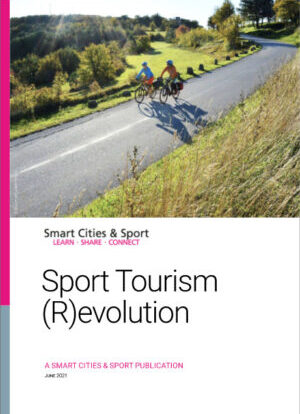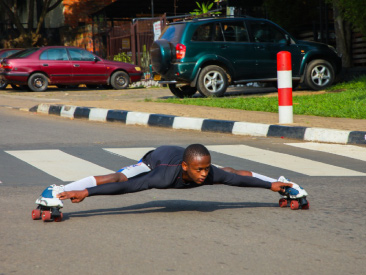tourism & city branding
Interview with Prince Deji Ajomale–Mcword, President, African Sports Tourism

Share this post
Could you please tell us more about the sport tourism landscape in Africa?
The sport tourism landscape in Africa is a virgin territory yet to be deliberately and consciously attended to. Very few African nations make a deliberate effort at development.
One major challenge sports tourism has in Africa is the lack of understanding of how and why sports and tourism administrators need each other. They remain aloof to one another. Sports administrators believe the travel profession is such a laid-back job that they can get any friend or associate who parades him/ herself as a travel agent to do it. They end up making a mess of the grand opportunity a sporting event provides for visiting sport tourists to experience their country or city. They do not leave up to expectations and are hardly bothered about the damage this does to the image of the destination.
Tourism boards sparsely identify or pay attention to the tourism that stems from sport.
Another major problem sport tourism encounters in most African nations is the act of paying attention to one sport while neglecting others; forgetting that no reputable sports destination was built on the back of a single sport. Every sport, especially those favoured by locals must be empowered to contribute to arrivals and gross domestic product.
What are the particularities of the African sport tourism market?
The holiday culture in Africa is particularly different to what transpires in other continents of the world. Soft sports tourism isn’t much of a thing yet. Hard sports tourism could be said to be chiefly driving sports tourism here, though, sporting events aren’t necessarily much in numbers, compared to what happens in the American and European continents.
How do African cities integrate sport into their tourism strategies?
For most, there aren’t any strategies, because they are yet to identify sport as tourism. A few cities standout for me. Johannesburg, Durban, Cape Town, Nairobi, Kigali, as well as Morocco and Egypt as countries. Cape Town is home to three of Africa’s biggest road races – Two Oceans Marathon, Cape Town Marathon and Comrades. These three marathons have proven themselves as billboards promoting the city’s attractions, as their locations are included in the race routes. They are also perfect excuses for social runners to visit the city, to run and experience the city’s fervour, while emptying their wallets with a smile on their faces. Cape Town also uses sport in promoting noble causes like conservation and carbon neutrality, which the city’s handlers seek to be known for. This is a solid approach to building lasting legacy.
Moses Mahbida Stadium in Durban attests to the city’s strategy to ensure that sporting facilities are multidisciplinary in outlook and utility. Not only does it host soccer matches, adventure seekers can go bungee jumping, ziplining and do other extreme activities.
Kenya is a country that favours more than one sport which makes it a destination for more than one sports.
I’m sure you are aware of Rwanda’s ‘Visit Rwanda’ campaign through Arsenal FC. Also, on the 16th of May, 2021, the NBA will be inaugurating African operations in Kigali, as the country seeks to make Rwanda the next top destination for basketball in Africa. African Sports Tourism Week Rwanda 2021 will be largely geared towards conservation and carbon neutrality in sport – topics dear to Rwanda’s heart.
It is important to understand that sport is one of the few universal languages. If you speak it well, as a destination, you will court many people from far and from near.
In your view, what are the key success factors of a sport tourism strategy for cities?
It is key to first and foremost identify the sports that locals favour, develop them, build infrastructure, encourage participation. This is because international arrivals is as important as internal travel inspired by sport. The pandemic made certain we learn that. It is possible for a westerner that’s yet to visit not to know that there are golf courses in Nigeria, but when they read or watch Georgia Oboh’s interview on CNN or Sky; they most likely would have a different opinion. It is from the locals that destinations pick ambassadors that fly their flags on global stages.
This is why a sport tourism strategy that will succeed cannot afford to leave locals out. Promotion can never be overemphasised. Destinations shouldn’t just build great facilities and expect them to be discovered out of the blue. It doesn’t work that way.
Own and be known for a major sporting event. Sporting events are multipurpose tools that discerning destinations use in opening up their domain to arrivals and foreign investments. A city hosting a major sporting event clearly sends a message to everyone that it is open for business.
Create commodities out of sporting activities, that can be sold as experience. The beauty in this is that they can make encourage visitors year-round happen year-round, if properly tailored and promoted. This tourism sustains destinations during those seasons when there are no major sporting events.
How has the COVID-19 pandemic impacted Africa’s sport tourism?
Just as sport tourism took a major hit in Europe and other continents of the world, this was also the case here in Africa. In fact, it is worse. Local football leagues rarely had stadium attendance pre-COVID-19. It became an all-time worst when people had more reasons to boycott the stadia.
In soft sports, with tourism drivers such as golf however, things took shape a bit. A number of obituaries of members of some of the top country clubs in Nigeria were being declared because the one thing that gets them active and basking in the pool of friendship and company was taken away, owing to closure of the clubs during the major height of the pandemic; other members who had been used to playing only in their own clubs sought opportunity to golf elsewhere – even if it meant travelling to other states in the federation in search of tee times. This isn’t to say that sport tourism has returned to what we used to know as normal. No, it hasn’t, thanks to the blow COVID-19 dealt both national and individual economies.
Now that the pandemic has compelled everyone to look inwards and become more active, it is my earnest hope that African nations look in the direction of sports tourism, knowing that sport is a pilgrimage that brings footfall like no other. And this charity needs to start from home. It is time to encourage our citizens to travel within our countries for sporting purposes.
The next edition of the African Sports Tourism Week will take place in Kigali, Rwanda and focuses on the theme of “Responsible Sports Tourism”.



